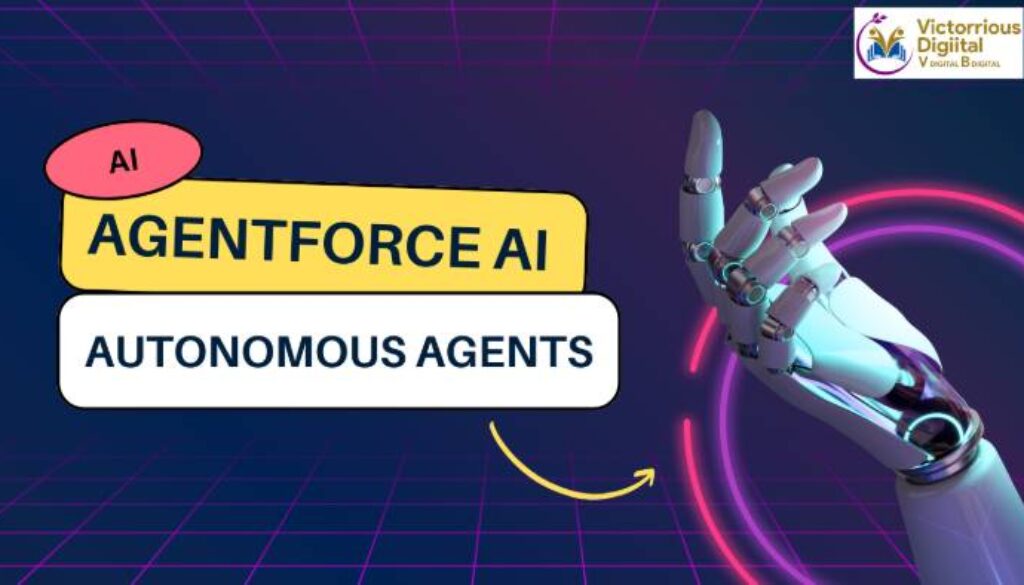Agentforce AI Empowering Sales & Service Teams with Autonomous Agents
Artificial Intelligence (AI) has changed the way businesses work. What used to take hours of manual effort can now be done in minutes with the help of intelligent automation. Salesforce, which is already known as a leader in customer relationship management (CRM), has taken this a step further with Agentforce AI.
Agentforce AI is designed to empower both sales and service teams by providing them with autonomous agents—AI-driven tools that can work like digital team members. These agents don’t just provide information; they can perform tasks, answer questions, guide customers, and support employees in real-time.
In this blog, we’ll explore what Agentforce AI is, how it works, and most importantly, how it helps sales and service teams deliver better results. We’ll also look at examples of how Agentforce AI can fit into everyday business workflows to make processes faster, smarter, and more efficient.
Table of Contents
What is Agentforce AI?
Agentforce AI is Salesforce’s platform for building and deploying autonomous AI agents. These agents can understand natural language, make decisions, and carry out tasks without needing constant human input.
Think of them as AI-powered assistants that are always available. They can talk to customers, answer common questions, guide sales reps with the right information, or even troubleshoot issues in real-time.
Unlike traditional chatbots that follow simple rules, Agentforce AI uses advanced AI (including large language models like ChatGPT) to adapt, learn, and respond in a way that feels more human and helpful.
Key Features of Agentforce AI:
- Conversational AI: Interact with customers in natural language.
- Task Automation: Handle repetitive tasks like scheduling, reminders, or data entry.
- Personalization: Provide tailored responses based on customer data.
- Integration: Work smoothly with Salesforce CRM and other connected apps.
- Continuous Learning: Get smarter over time by analyzing interactions and outcomes.
Why Agentforce AI is Important in 2025
Businesses today face huge competition. Customers expect quick replies, personalized experiences, and accurate solutions. At the same time, sales and service teams are under pressure to deliver results faster.
Here is where Agentforce AI makes a difference:
- Saves Time – Routine tasks like data entry, meeting prep, and follow-ups can be done by AI.
- Reduces Errors – AI follows rules without forgetting details.
- Improves Customer Experience – Customers get faster and more accurate responses.
- Supports Teams – Instead of replacing employees, it helps them focus on more meaningful tasks.
In simple words, Agentforce AI allows teams to do more with less effort.
How Sales Teams Can Use Agentforce AI
Sales teams often spend too much time on admin work instead of actually talking to customers. Agentforce AI changes this by taking care of many behind-the-scenes tasks.
Step 1: Research Clients Before Meetings
Instead of manually checking LinkedIn, company websites, and old records, sales reps can ask Agentforce AI to prepare a complete summary of the client. This includes industry trends, latest news, and past interactions.
Step 2: Write Personalized Emails
Salesforce’s Agentforce can create ready-to-send emails that match the client’s profile. This saves time and makes communication more engaging.
Step 3: Update CRM Automatically
One of the biggest complaints from sales reps is updating CRM records. Agentforce AI can automatically log calls, update meeting notes, and add opportunity details without manual effort.
Step 4: Smart Recommendations
AI can suggest next best actions.
For example, it may recommend calling a client who has shown interest in a product or sending a discount to a lead who is close to conversion.
Step 5: Automating Repetitive Sales Tasks
Instead of manually entering data after every client call, Agentforce AI can automatically log conversations, update contact details, and schedule next steps.
Example:
- A sales rep finishes a call with a potential client.
- Instead of writing notes and updating Salesforce, the agent automatically records the summary, updates the opportunity stage, and sends the rep a reminder for the next follow-up.
This reduces administrative work and ensures that no information is lost.
Step 6: Real-Time Sales Coaching
Agentforce AI can act like a real-time coach during customer interactions. By analyzing conversations, it can suggest the best responses or recommend offers.
Example:
- A rep is on a live chat with a customer considering a product.
- The AI agent instantly suggests highlighting a case study relevant to the customer’s industry.
- It also reminds the rep about a discount available this week.
This helps reps provide timely, relevant, and persuasive responses that can lead to conversions.
Step 7: Smarter Lead Prioritization
Not all leads are equal. Some are more likely to convert, while others may need more nurturing. Agentforce AI can score and prioritize leads based on behavior, past interactions, and data patterns.
Example:
- A company gets 100 new leads in a week.
- Agentforce AI analyzes them and highlights the 20 most promising based on email engagement, website visits, and previous purchases.
- The sales team can focus on those leads first, increasing chances of success.
How Service Teams Can Use Agentforce AI
Service teams handle a high volume of customer questions every day. Many of these are repetitive. Agentforce AI can step in and handle these efficiently.
Step 1: Handle Simple Queries with Chatbots
Many service requests are repetitive—like password resets, billing questions, or product updates. Agentforce AI can handle these instantly without human intervention.
Example:
- A customer asks, “How can I reset my password?”
- The AI agent immediately provides step-by-step instructions and even sends a reset link.
- The issue is resolved in seconds, saving human agents for more complex cases.
Step 2: Assist Human Agents During Calls
For complex cases, the AI doesn’t replace human agents but supports them by suggesting solutions or pulling relevant customer data instantly.
Example:
- A customer complains about a delayed order.
- The AI agent retrieves the customer’s purchase history and delivery details and suggests a response with an apology plus a tracking update.
- The service agent can quickly share this information with the customer.
This reduces handling time and improves customer satisfaction.
Step 3: Predict Customer Issues
Agentforce AI can also analyze patterns to identify potential service issues before they escalate.
Example:
- Several customers are facing login issues after a system update.
- The AI agent identifies the trend early, alerts the IT team, and shares a ready-to-send communication for service agents.
- Customers are proactively informed, reducing frustration and call volume.
Step 4: Automate Case Updates
After resolving a case, AI can update records, close tickets, and send follow-up emails. This reduces manual workload for agents.
Benefits of Using Agentforce AI
When sales and service teams use Agentforce AI, the organization benefits in multiple ways:
- Increased Productivity: Automates repetitive tasks so teams can focus on strategic work.
- Faster Responses: Customers get answers instantly, reducing wait times.
- Personalized Interactions: AI uses CRM data to make every response relevant.
- Cost Efficiency: Reduces the need for large support teams by automating routine queries.
- Scalability: Can handle thousands of interactions simultaneously.
- Better Customer Experience: Quick, accurate, and personalized responses improve satisfaction.
Step-by-Step Guide to Getting Started with Agentforce AI
If your company is using Salesforce, here is a simple path to start with Agentforce AI:
Step 1: Enable Agentforce in Salesforce: Work with your Salesforce admin to activate Agentforce features.
Step 2: Train AI with Your Data: Upload customer data, past cases, and sales records so the AI can learn your business.
Step 3: Start with Small Use Cases: For example, let AI handle email drafts or customer FAQs before moving to bigger tasks.
Step 4: Monitor and Improve: Keep an eye on AI’s performance and fine-tune responses.
Step 5: Scale Across Teams: Once you trust the results, expand AI usage across all sales and service functions.
Challenges to Keep in Mind
While Agentforce AI is powerful, businesses should also be aware of challenges like:
- Data Security: Always ensure customer data is safe.
- Human Oversight: AI should not work completely alone, human checks are still important.
- Training Time: AI may take time to understand your processes.
- Employee Adoption: Teams need proper training to use AI effectively.
Tips for Success with Agentforce AI
- Start Small – Don’t try to automate everything at once.
- Train Teams – Make sure sales and service agents understand how to use AI.
- Focus on Customer Experience – Use AI to improve response time and personalization.
- Review Regularly – Continuously check AI’s performance and make updates.
Why Businesses Should Embrace Agentforce AI
Businesses that adopt Agentforce AI will gain a clear advantage. In today’s competitive market, speed and personalization matter more than ever. Customers expect instant responses, and sales teams need smarter tools to stay ahead.
By adding autonomous AI agents into daily workflows, businesses can:
- Close deals faster.
- Retain more customers through better service.
- Save time and money with automation.
- Build stronger customer relationships with personalized engagement.
Conclusion
Agentforce AI is one of the most exciting innovations in Salesforce today. By introducing autonomous agents, it helps sales and service teams save time, reduce errors, and provide better customer experiences. Instead of replacing employees, it acts like a smart assistant, allowing teams to focus on what they do best—building relationships and solving problems.
For businesses in 2025, adopting Agentforce AI is no longer optional—it’s the future of customer engagement.
Read Also: Salesforce Training in Pune | Expert-Led Classes at Top Institute




